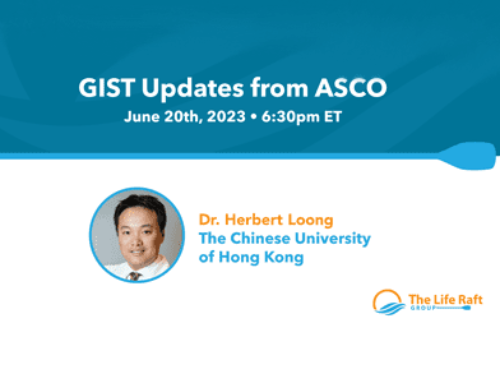Dr. Sosipatros Boikos, a graduate of University of Crete in Greece, very early and while he was a first year medical student, developed an interest in cancer genetics. After graduating from medical school, he came to the National Institutes of Health (NIH) as a Visiting Research Fellow to work on the genetics of wildtype gastrointestinal stromal tumors—those Gastrointestinal Stromal Tumors without a KIT or PDGFRA mutations–under the supervision of Dr Constantine Stratakis, the researcher who identified the Carney-Stratakis Syndrome.
Now, as a medical oncology fellow at John Hopkins University and a clinical collaborator at NIH, under the guidance of Dr. Lee Helman, he finds himself at the helm of the National Institutes of Health’s Pediatric and Wildtype GIST Clinic, immersed in clinical and basic research that he hopes will lead to new targeted treatments for the Pediatric and Wildtype GIST within the next four to five years.
 Dr. Boikos and Mrs. Lauren Long, research nurse of the NIH WT GIST clinic, assisted Dr. Lee Helman to coordinate the 10th WT GIST clinic that was held in Bethesda, Maryland, during the last week of June. Eleven patients were able to attend this clinic.
Dr. Boikos and Mrs. Lauren Long, research nurse of the NIH WT GIST clinic, assisted Dr. Lee Helman to coordinate the 10th WT GIST clinic that was held in Bethesda, Maryland, during the last week of June. Eleven patients were able to attend this clinic.
“The clinic is unique because we can get a good sense of the natural history of the patients who participate,” he said. “WT GIST is a disease that appears to include distinct subgroups, based on the genetic and clinical characteristics. We wouldn’t be able to identify these subgroups without a multidisciplinary approach.” Patients who participated in the clinic interacted with medical oncologists, surgeons and geneticists. He said collaboration among these GIST experts is “essential” to the success of the clinic.
He said that five years ago, “We didn’t know much about Wildtype GIST.” But the clinic has been an excellent model for research and “it’s true that we’re moving faster.“
Dr. Boikos said work is being done to characterize cell lines that were isolated in Wildtype and Pediatric GIST patients, which will help researchers move closer to targeted treatments. Germline mutations in succinate dehydrogenase subunits A, B, C, or D (SDHx) and absence of SDH protein expression associated with mitochondrial dysfunction have been recently described in patients with WT GIST. These SDH-deficient tumors were also recently found to contain a hypermethylated phenotype. Dr. Boikos mentioned that maybe it is time for a new definition for WT GIST, which would include hypermethylation and mitochondrial dysfunction due to SDH loss of expression.
One new trial for patients with WT GIST is going to open soon at NIH. This study will utilize a drug called Vandetanib, a small molecule receptor tyrosine kinase (RTK) inhibitor which is active against VEGFR2- and EGFR- dependent signaling. It is also potent inhibitor of RET, which is frequently activated by mutation or rearrangement in medullary thyroid carcinoma (MTC). Vandetanib has shown activity in Medullary Thyroid Carcinoma while preclinical studies with a SDH-deficient renal cell carcinoma cell line have also shown activity with no significant toxicity. This study is being run by Dr. Fernadna Arnaldez from the National Cancer Institute, NIH, and will open initially in just one location, at NIH in Bethesda.



